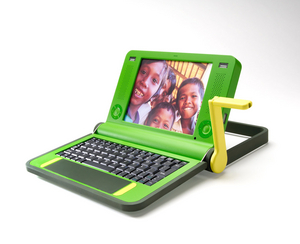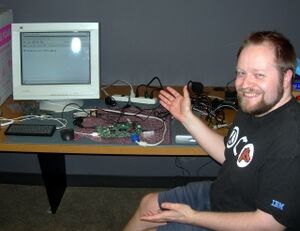One Laptop per Child
The MIT Media Lab has launched a new research initiative to develop a $100 laptop—a technology that could revolutionize how we educate the world's children. To achieve this goal, a new, non-profit association, One Laptop per Child (OLPC), has been created, which is independent of MIT.
The official proje
The Green Machine prototype, styled by Design Continuum, was unveiled at WSIS, Tunisia by UN Secretary-General Kofi Annan and Nicholas Negroponte.
Fuseproject has developed some recent prototypes: the Blue Machine and the Yellow Machine.
We have several groups looking at different human-power options, including a hand crank, a foot treadle, and a pully system. Our goal is a minimum of a 1:10 ratio of "cranking" to use, e.g., one minute of cranking give you ten minutes of use. We'll post details as they become available.
The hardware specification for the first generation machine is pretty much set.
The software
We are committed to the principle of Open Source for this project. Please refer to our manifesto: OLPC on open source software.
Developing software for this machine is very straight forward, though there are development issues you should be aware of. Our partner in software development is Red Hat.
We have begun an OLPC software task list. Please help us refine this list.
Discussion of Instant Messaging Challenges lays a framework for thinking about the different challenges facing the use of instant messaging applications as they exist today on the $100 laptop. Those issues will need to be overcome if instant messaging is to be usable within the environments in which the $100 laptop will be deployed.
Discussion of eBook feature set is a page in which traditional and nontraditional features are discussed both in abstract and in relation to the different eBook readers out there.
Wiki as an ebook reader is where we discuss the suitability of wiki as an ebook distribution medium, and why it would help solve some of the other challenges that the $100 laptop is trying to address.
Educational content
OLPC is based on "constructionist" theories of learning pioneered by Seymour Papert and later Alan Kay, as well as the principles expressed in Nicholas Negroponte's book 'Being Digital'. Some background on our approach can be gleaned from David Cavallo's essay, "Models for growth—towards fundamental change in learning environments"
Launch plans
The laptops will be sold to governments and issued to children by schools on a basis of "one laptop per child." Initial discussions have been held with China, India, Brazil, Argentina, Egypt, Nigeria, and Thailand. In addition, a modest allocation of machines will be used to seed developer communities in a number of other countries. A commercial version of the machine will be explored in parallel.
There are a series of pages in this wiki dedicated to OLPC Thailand, OLPC Brasil, OLPC Argentina, OLPC Egypt, OLPC Greece, OLPC Nigeria, OLPC India, and OLPC China. Other pages will follow.
Getting involved
There is a page in this wiki dedicated to Getting involved in OLPC, an OLPC Idea Pool page, an IRC channel (irc.freenode.net, #OLPC), mailing lists for generic OLPC discussions not specific to any Linux distribution, and a Jobs at OLPC page.
There is a Fedora Project for OLPC, where you can get the Fedora software for the OLPC hardware and join Fedora OLPC related mailing lists.
Watch this space for information about our hardware developer's program. We are having significant numbers of prototype electronics built for people who need early access to the hardware for device driver, power management, wireless, distribution and UI work. The beginnings of notes on using the OLPC developer boards contain information that may be useful to those working on this early hardware.
Also, we are doing a OLPC Google Summer of Code.
FAQ
The official FAQ is on the project website, but please feel free to pose additional questions here: OLPC FAQ. There is also a collection of OLPC myths that has been accumulating.




